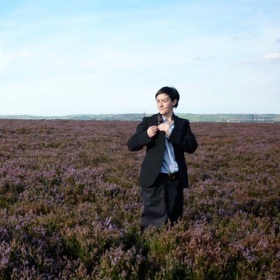Fatherland

Familial roots form the basis for Nic Green’s latest work, in which an isolated encounter with her absent Scottish father prompts an embodied investigation of heritage, bloodlines and belonging. This clash of dance, drumbeats and delicate spoken word – with bagpipes and whiskey thrown in for good measure – powerfully transports us to the land of Green’s fathers and to an almost primordial confrontation with place.
In place of the father she met just once, Green recruits a group of male audience members, who form a whole chorus of fathers. This is an unexpectedly moving creation of presence in absence, while the overlapping voices of the volunteers reading Green’s father’s words from a screen above the performance space invoke a strange ghostliness. This halting, dislocated conversation between Green and her father(s) opens the show, preceding a dance from the country that Green is both deeply connected to and sharply separated from.
As gentle, poignant and poetic as Green’s opening text may be, it is the central dance of the piece that gives it its haunting intensity. Accompanied by drumbeats, Green begins by slowly tracing a chalk circle – already an image with so many mythical and cultural associations – on the floor of the Battersea Arts Centre’s echoing Council Chamber. From this moment, the dance within the circle builds from slow, deliberate gestures to an almost frenzied pitch of sound and movement.
The escalating speed and strength of Green’s dancing is matched by her brilliant ensemble of drummers, beating out a rhythm that intensifies by barely perceptible degrees, until it is suddenly almost deafening. Recalling an earlier description of the universe as a vibration of solids in space, the drumming and the fierce stamps of Green’s feet vibrate through the audience, closing the space between us. There is an instinctive physical response to this pounding noise, this heartbeat of the land; everywhere in the audience, bodies involuntarily follow the pulse of Green’s dance. Using just drums and bodies, the piece somehow evokes a return to the rhythm of the earth.
There is a beauty, joy and power to this dance, but it is tempered with an underlying sadness. Calling in the bagpipes and singing mournful songs of ages gone by, Green evokes an elegiac mood to counter the visceral ecstasy of her movement, and the full, complex range of emotion connected to family and home is implicitly brought into play. In tracing her own roots back to the home of her ancestors, the impact of Green’s show lies in both its autobiographical intensity of emotion and its suggestion of human ritual – with all the sadness, delight and community that implies.










